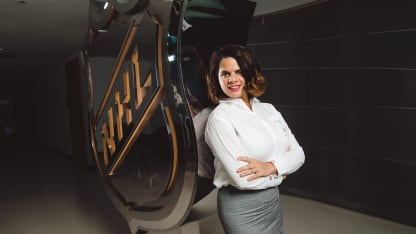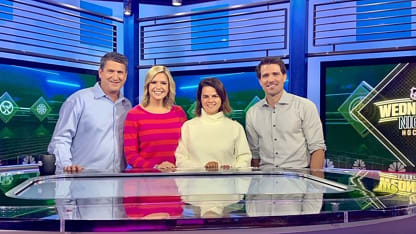A year later, Denver Nuggets center Nikola Jokic, who won silver for Serbia after losing to the United States at the 2016 Olympics, came back to the national basketball team. The headline showcased the return of the best center in the world.
"I didn't see blue eyes or abs," Kolundzija said. "The headline for the volleyball player should be like, European champ or world champ again on national team, or something like that."
Kolundzija has reported at B92 for 12 years after starting as a volunteer. She has interviewed numerous athletes and authored a documentary about tennis star Novak Djokovic, a winner of 16 Grand Slam singles titles. She's still asked in her country if she really loves sports and watches the games. "Why wouldn't I? It's normal," she said with the verve she showed during her time with the NHL, the host organization for the Global Sports Mentoring Program. The program is a collaboration between the U.S. Department of State, the University of Tennessee and espnW that focuses on advancing gender equality by empowering women through sports. Twice annually, participants between the ages of 25 and 40 demonstrating leadership skills and experience in the sports sector are chosen from a list of nominees selected by U.S. embassies around the world.
With help from the NHL and visits to NHL Network and NBC Sports, Kolundzija developed an action plan to change the narrative and create equality in Serbia, where 51.3 percent of the population are women.
"We usually have ads for a new TV, in those ads there are always men," she said. "Women go shopping and men want to buy a new TV just to have a perfect TV to watch games. Why? I want to watch those games too. I don't want to go shopping, I want to watch the game. Why is that so strange?"
Kolundzija will present her action plan to the State Department in Washington next week and look to create new platforms and connect with new audiences by starting a podcast in June 2020 and covering and producing three stories per day on B92.net. The 2020 Tokyo Olympics also will fashion opportunities for further exposure that will help achieve her goal of making female athletes more visible in media and change how they're presented.
"I need to increase the number of news and feature stories of female athletes and make them feel like athletes, not like objects who people want to see their hair, their body and so on," Kolundzija said. "I can do that first for the media outlet I work for and [then] I can go beyond that."




















